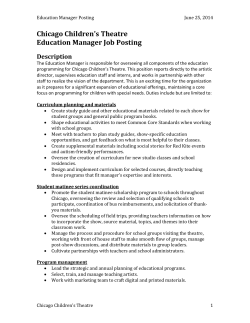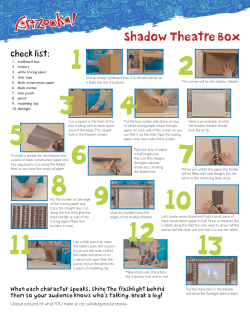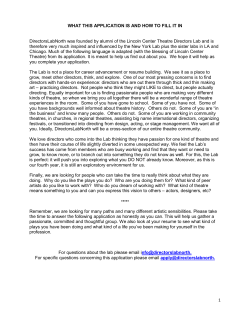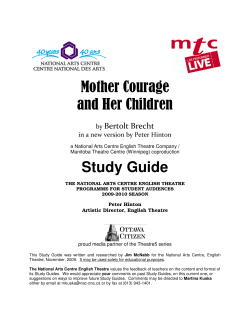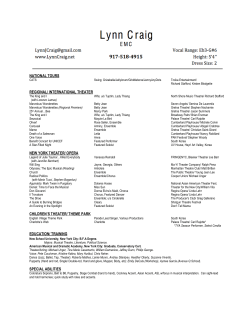
Management for Anaesthetists as a Career Interest? Sally Wilson
Management for Anaesthetists as a Career Interest? Sally Wilson Director for Quality and Clinical Governance Queen Square National Health Service Established in 1948, Aneurin Bevan 4th largest employer in the world Chinese people’s liberation army Walmart supermarket Indian railways 2012 - £110 billion free to all at the point of care 80% budget on patient care 1 million patients every 36 hours Highly complex Management from political level to patient interface Putting the patient at the centre of all we do What does the Organisation look like ? University College Hospitals London NHS Trust Medicine Board Surgery Board Specialist Hospitals Board Divisional Manager, Queen Square Division Jackie Sullivan Deputy: Emma Kelly Clinical Neurology Therapy & Rehabilitation NeuroRehabUnit (NRU) Albany Rehab Unit (ARU) ABIU HASU SU Thames Stroke Therapists Med Secs Social Work BM: Adrian Capp ACD: Val Stevenson** Matron: Liz Davies ABM: Sue Jeffrey Day Care Dementia Headache Movement Disorder MS General Neurology Epilepsy Endocrinology NeuroResponse Med Secs Neurology Wards Telemetry Huntingdons Disease Chalfont UCH Liaison Service BM: Alexa Coombes ACD: Dr Cath Mummery Matron: Liz Davies ABM: June Boyle Divisional Clinical Director, Queen Square Division Prof John Duncan Deputy: Sally Wilson* OPD Services & Diagnostic Services OPD Patient Booking Team Patient Transport Main Reception Neuro-Metabolic (Path) Neuro-Genetics Prion Neuro-Physiology Radiology Med Secs Clinical Site Managers Pre-Admission Discharge Lounge Practice Development Team Admission Lounge Admissions BM: James Frost ACD: Dr Simon Farmer Matron: Ellen Butler Divisional Finance Manager Mariyana Zaharieva Support: Jessica Oldroyd * DDCD for Governance & Quality, and ACD for Pain BM – Business Manager ACD – Associate Clinical Director ABM: Assistant Business Manager Surgical Services, Theatres & Critical Care Neuro & Spinal Surgery Neuro-Oncology DBS ONS Pituitary Surgery Skull Base Neurosurgical Wards Anaesthesia Sleep Study Theatres Intensive Care Plasma Exchange Brain Tumour Unit Gamma Knife Med Secs BM: Jamie McFetters ACD: Miss Joan Grieve ACD: Mr Robert Bradford ACD: Dr Ian Appleby Matron: Sam Abdul ABM: Eleanor Wilkie HR Business Partner Ragini Patel Specialist Services RLHIM & Private Patients RLHIM Private Patients PPCR Facilities SLA (GOSH) Lecture Theatre/Seminar Room Performance & Efficiency Governance Team Deputy DM: Emma Kelly ACD: Dr Peter Fisher Matron: Sam Abdul CD Metabolic Neuro-Otology Neuro-Ophthalmology Uro-Neurology** Voice Dystonia Neuro-Psychiatry Neuro-Psychology Pain Management* Autonomics Med Secs Neuromuscular Cochrane BM: Angela Hughes ACD: Dominic Heaney ACD for Pain: Sally Wilson* Matron: Ellen Butler ABM: David O’Keefe Information Manager Gary Cairney (Post Shared with EDH) Anaesthetists as Managers? Qualities of a good anaesthetist Self awareness Working in teams Managing resources Ensuring patient safety Making decisions and assessing change Anaesthetists as a resource 15% consultant workforce Wide range of services – anaesthesia, pre-admission, ITU, pain management (acute and chronic), outreach, palliative care Organisational overview Operating lists Large departments – rota Adaptable responsible service My Role Consultant neuroanaesthetist Director for Quality and Governance Deputy Clinical Director Clinical Lead Management NeuroAnaesthesia NeuroCritical Care NeuroRadiology Pain Management Link between clinical staff and management Clinical Management in UK Few full time managers 3.5 clinical days per week plus on call duties Theatres 2 days, NCCU 1 day, GA MRI list Paid additional 4 hours / week for management Difficult to assess the exact number of management hours per week Clinical Management Team Weekly management meeting (1-2 hour) - clinical and non-clinical managers, senior nurses, finance, human resources Rolling programme where all key areas present past successes and achievements with future plans Discuss finance, quality issues and key developments Clinical managers and the departments Monthly meetings with head departments – formal or informal Explain the hospitals management plans to the department Learn of clinical issues within the department May offer advice to progress problems or take issues back to management team What Clinical Managers Don’t Do Routine finance or target discussions within department Manage department Directly influence the clinical focus within the department Deal with day to day problems Manage routine minor and moderate risks within the department What Clinical Managers Do? Help, support & develop clinicians within the department, by Appraisal Job planning Investigate serious incidents Balance individual departmental needs v’s hospital focus Service development New consultant posts Manage difficult consultants Appraisal Performed for all consultants in NHS annually Retrospective Formal process – revalidation Individual performance – activity and outcomes Continuous Education & Professional Development (CEPD) Action plan for personal development Time to reflect Job planning Service delivery Annual and prospective Consultant’s contract with the NHS Ensure fair working week for all Includes elective / emergency work Time for activities to support clinical work Clinical audit, committees, examining Managing People Understand Decide My aims, priorities, options, solutions, plans Communicate The context, my responsibilities, tasks constraints, opportunities, risks Clearly and empathically, listening and responding Motivate Set an example, enthusiasm, respect, establishing trust / earning respect The Blue Sky Thinker The Problem International expert Head of department Grand plans for massive future development at UCLH Message that development blocked by ‘management’ Department in chaos 3 locum consultant posts Long waiting lists Complaints Resigns –no stability What next? The Process Meeting with senior members of department Explained the need for clear departmental plan Supportive of expansion No expansion until short term problems clarified Time to reflect The Solution Departmental Head continues Additional individual for the detail ! Arguments in public Dr A and Dr B do not like each other Dr A busy operating list Dr B urgent difficult tracheostomy. Only list with short cases is Dr A’s list. Theatre manager suggests this list for tracheostomy No discussion Patient arrives in anaesthetic room Major row in theatre corridor Another theatre has to be found for case The following day both consultants complain about each other Theatre staff all discussing the argument Something must be done! The solution Arrange to meet both consultants Structure to discussion. Not personal. What was supposed to happen? What did happen? Why was there a difference? Both apologised and agreed behaviour unacceptable Management learning Understand that you will never keep everyone happy Change is hard Uncertainty is harder People will always be suspicious of management Keep a sense of perspective and a good sense of humour!
© Copyright 2025

